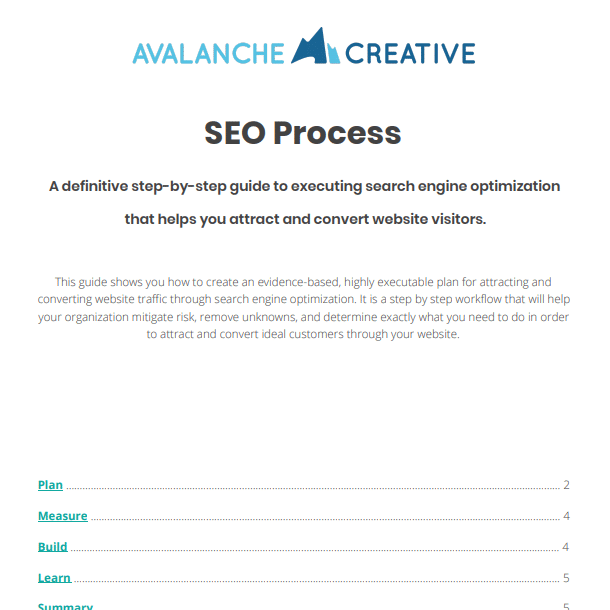SEO Blog Writing Tips: How to Rank Higher on Google
Category: Content Strategy | Tags:
What Is SEO?
If you have an online presence and are looking to increase and improve the amount and quality of leads entering your website, you need to be putting effort into search engine optimization (SEO). SEO involves the process of utilizing researched, meaningful content to connect potential customers to your goods and services while increasing brand awareness.
SEO Blog Writing
Have you ever asked yourself, “How do I rank my blog in Google?” Leveling up the search engine result page is entirely doable, and creating content with good SEO practices is the first place to start. Wondering how to write SEO content? We’re happy to help.
Does Blogging Help SEO?
Yes. Blogging—the art of creating educational and engaging written content that provides valuable, industry-based information—does help SEO. This is accomplished through the use of searchable keywords that relate to your content and brand objective, but most importantly, keywords that align with searcher intent.
When you answer questions that are being asked in the search engine bar, Google crawls the content and subsequently indexes it for all to see, based on keyword usage, internal and external linking, and a well-designed sitemap.
SEO Best Practices for Blog Posts
To ensure your blog is reaching its full potential, there are necessary SEO tips and tricks to always implement. Each of these individual strategies works together to rank a website higher, resulting in more qualified, ready-to-purchase consumers.
- Understand Your Audience
It is of utmost importance to plan for and recognize searcher intent. Ask questions from the perspective of your intended audience by remembering they are a real person with real questions looking for real answers. Whether they are browsing for high-level information or seeking technical, detailed solutions, make a list of the possible topics they are interested in or problems they require help solving—and then be that help.
Writing for a real person, rather than the search engine, means you need to give them a reason to stay on your page and make it to the call to action, so consider what strategy works best for your brand, whether that is a free offer or highly beneficial, easily digestible information.
- Keyword Research for SEO Blog Posts
Keyword research is necessary when it comes to ranking on the SERPs. As the blog writer, you need to select a group of terms with proven, favorable data to include in your piece that will match with the searcher’s intent.
Multiple long-tail keyword phrases can be the difference between an article that ranks high on Google, is often backlinked, is utilized by high-value customers, and an article that you’ve spent time and energy on, but no one (or no search engine) sees.
Now is a good time to include that keyword stuffing is a big NO! Not only do search engines not like this, the reader also finds it robotic, redundant, and a waste of time. Use your group of relevant keywords naturally, rather than seeking to reach a specific number of repetitive uses.
- How to Title Blog Posts for SEO
Crafting a brief, informational, and search-appropriate title is key to getting a user to click. Your title should deliver value to both the search engine and consumer by including your main keyword and the context of the article. Is this a ‘What Is:’, ‘How To:’, or ‘Benefits of:’ piece? Make sure the user knows what they are diving into easily and in a timely manner.
- Create Informational Headers
Scannable, easily comprehensible headers are very useful, as they provide the chance for your reader to ensure your blog is covering all the points on which they are seeking guidance.
It is a good rule of thumb to include keywords with context in your headers to guide both users and Google through your piece. When you create a flowing, engaging structure with thoughtful headers, readers will be appreciative and likely return to explore your other content.
- Link-Building for SEO Blog Posts
Rising on the SERPs means creating authority, and this can be done by increasing the number of links your article or blog post contains. Linking to reputable external sources provides additional information to Google about what your blog pertains to, and linking to relevant internal sources provides more value to your reader.
Don’t be shy about promoting your own content to non-direct competitors in similar industries to secure their backlinks, which gives you exposure while providing their readers with more great information. For example, a florist could send their “How To Create a Wildflower Bouquet” article to a wedding venue website and ask for a link.
Anchor text is also an important part of link-building. This is the visible word or phrase containing a hyperlink, connecting web pages to one another. Keep anchor text descriptive, as SERPs like Google use this in categorizing what a page is about.
- Optimize Metadata, Media, and Alt-Text
In order to make your blog the best it can be, you need to fine-tune your metadata. This refers to the title, description, and slug of your piece.
Aim to meet the character guidelines of 50–60 for the title and 130–160 for the meta description to keep it digestible and to the point, increasing the likelihood of someone clicking for more information. Your slug, the last part of your URL, should follow the same principles as the title: brief, descriptive, and certainly including a main keyword.
Media, in the form of a video or photo, always helps retain attention on a blog post. Your media should be properly compressed to ensure a fast page load time, and also feature alt-text, which provides use to visually-impared users as well as search engine crawlers.
- Content-Length Considerations
Substantial content is key. While the algorithm of search engines is always changing, various trends indicate that the longer a blog is, the better it performs. Our SEOs can even tell you the ideal content length depending on the given blog topic, ensuring your meeting industry-specific needs.
However, quantity should not trump quality, so in your effort to provide meaningful, quality information, avoid becoming redundant or straying from your topic.
Hiring an SEO Agency vs. DIY SEO Blog Writing
Trying to decide if you should take the reins on writing your own blogs or reach out to an SEO agency? You’re in the right place.
Optimizing Your Own Blog Posts
Pros
- You have full control over the content, including whatever specific style or tone of voice you are hoping to achieve.
Cons
- Learning the rigorous process of SEO and then writing SEO-friendly blogs takes time away from your business endeavors.
- Non-SEOs are often limited by software availability and usability, which can take years to master.
- It is easy to make critical mistakes like keyword stuffing or not using data-driven keywords.
Working with an SEO Content Writer
Pros
- They have access to professional software for proper research of keywords as well as highly useful competitor analysis.
- With roles specialization comes an extensive knowledge of SEO, delivering top quality work while allowing you to run your business.
- Search engine algorithms are always changing. SEO agencies like Avalanche provide continual research and relevant tweaking of topics and keywords for future posts, ensuring steady growth and continual lead generation.
- An entire team of people go into producing a high-ranking blog, meaning content is always edited and checked before publishing, decreasing the possibility of error.
Cons
- It is an additional business expense, but a people- and data-driven SEO team ensures you will see ROI through the generation of highly qualified leads.
SEO Blog Writing Services in Grand Rapids
Ready to boost your blog posts and incoming leads with SEO? Message us to chat about your needs and dreams. We have a whole team excited to help transform your online presence.
Download the Style Guide Template
Share this article:
The Avalanche Email: Fun. Simple. Educational. No Selling.
Learn Result-focused SEO & Content
Join over 2,272+ others who get one email every Wednesday with simple instructions on how to get more website traffic and leads through SEO and content marketing. (Learn more about the email)
Consistent Content is Key
Download the Style Guide Template

We create client-specific style guides so your content will always be accurate and consistent. Be the hero of your organization’s content output—download our FREE style guide template.
Related Resources

Download our SEO Process.
Keep Learning
Creating the Perfect SEO Content Template in Google Docs
Learn how to create an SEO Content Templates in Google Docs to help drive new traffic to your website from the search engines. SEO Content Templates provide specific recommendations and directives for creating new content on your website with the purpose of improving your SEO.
How To Show Up in Gemini (And Win More Local Jobs)
Show up in Gemini when homeowners search for landscaping services. Build the right signals on Google and your website to win more qualified local jobs.
How to Run Google Ads for Landscapers: A Complete Guide
Learn how to set up Google Ads for landscapers, attract qualified leads, and win more local jobs with this step-by-step guide.
🏔️ Watering > Planting New Seeds
Your next marketing win may already be on your site. Learn how to optimize existing pages for better rankings, traffic, and results.
The Recipe vs. The Meal
Your customers buy the experience, not the product. Discover a simple way to shift your message from ingredients to the full meal.
What’s the Best CMS for Landscaping Businesses?
Compare the best website platforms for landscapers. Learn the pros and cons of Wix, Squarespace, and WordPress, and why WordPress is best for long-term SEO.



